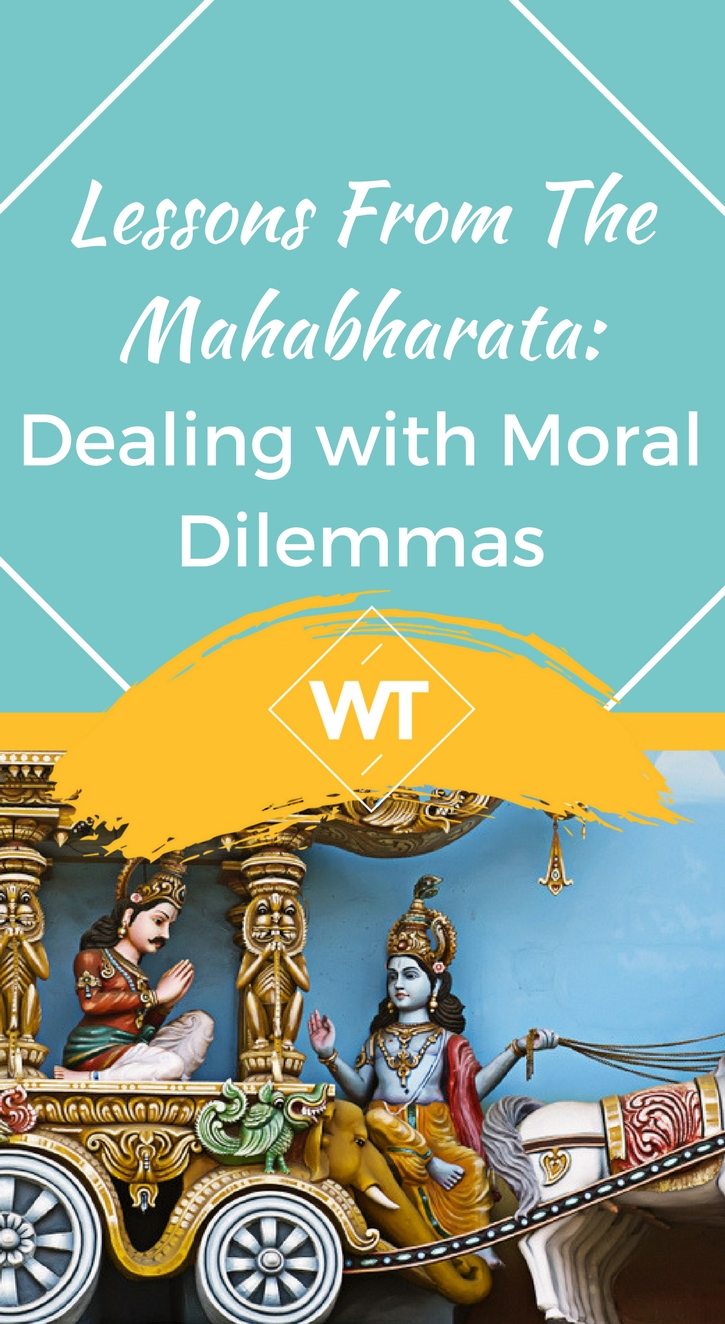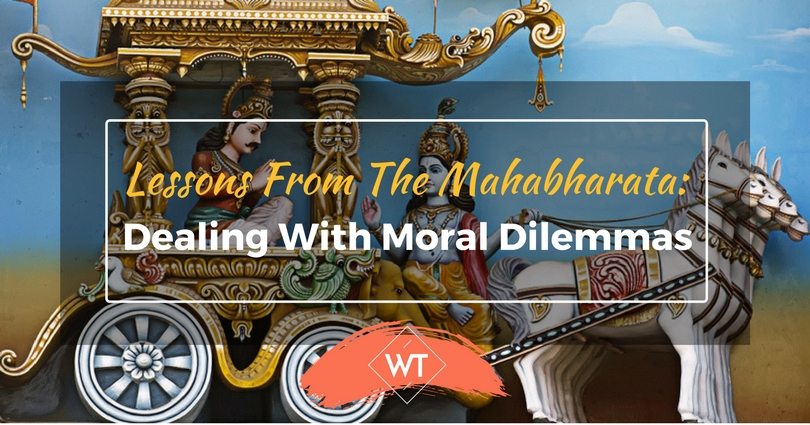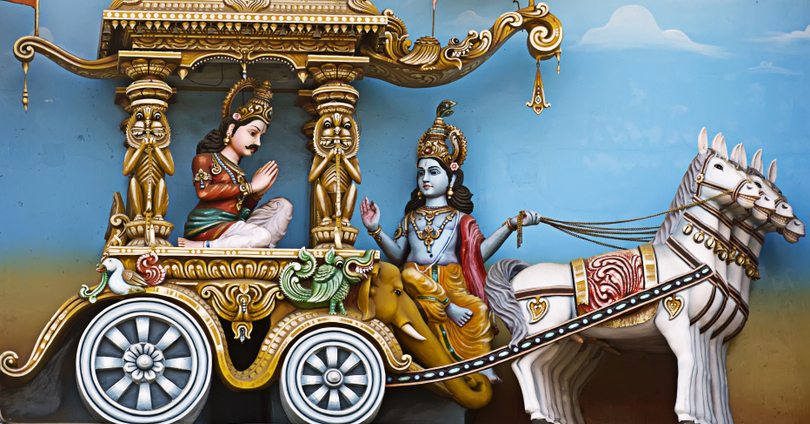Lessons from The Mahabharata: Dealing with Moral Dilemmas

Have you ever experienced an internal debate or confusion in your mind about what would be the ‘Right’ thing to do in a given situation in your organization, family or friend circle from a moral perspective? Some lessons from the Mahabharata—the great Indian epic—can prove to be a guiding force to help you make the correct decision in your own life.
Mahabharata throws light on what we must not do in life. By invariably doing the wrong things, the characters of the Mahabharata tell what we must avoid in our own lives.
Lessons from the Mahabharata – Does the End Justify the Means?
Lord Krishna reiterates time and again in the Mahabharata that the war against the Kauravas was not for the limited objective of punishing those particular evil doers but to set an example for society for all time to come that truth triumphs over evil. God Himself, in His incarnation as Krishna, interprets the law in favor of Truth and drives the chariot of the warrior who had the courage to battle evil and falsehood in the Dharamyudha.
If we closely examine the game of dice played at Kurukshetra, Duryodhana and his evil uncle Shakuni creatively twisted the rules of the game when they played the game of ‘chauser’ while Shakuni executed the moves on Duryodhana’s behalf.
The Kauravas broke one of the most sacred laws of treating women with dignity and respect when they attempted to disrobe Draupadi at the court in Hastinapur with all the elders (Dhritarashtra, Bheeshma, and Dronacharya) present. Lord Krishna Himself had to save her honour by increasing the dimensions of her sari for as long as Dushyasana kept pulling at it. These are only a few instances of when Duryodhana and the Kauravas broke well-established moral and ethical laws to harm the innocent and righteous Pandavas.
Lord Krishna used diverse strategies to ensure the defeat of the Kauravas (representing evil) and the final victory of the Pandavas (representing good) in the Dharamyudha of Mahabharata.
Lord Krishna plays a role in getting Karna to use his ‘Divyastra’ against Bhima’s son, Ghatotkacha, who on Krishna’s advice, wreaks havoc on the Kaurava forces after dark when his demonic powers come into full play.
Karna—the son of the Sun God—had been given a celestial weapon or Divyastra which he could use only once and he wanted to use it as the final weapon to defeat Arjuna and the righteous Pandavas. Using Ghatotkacha, Krishna wanted Karna to expend that weapon even if it meant fighting after the official close of action for the day with the setting of the sun.
When Bheeshma was proving to be an invincible general of the evil Kauravas, Krishna used the part male and part female Shikhandi as a shield for Arjuna to hit Bheeshma knowing that the latter’s code of chivalry would force him to lower his weapons when confronted by Shikhandi.
Similarly, when the venerable teacher of both the Pandavas and the Kauravas, Dronacharya, was proving to be a thorn in the flesh of the righteous Pandavas, Krishna devised a strategy of weakening Dronacharya psychologically by ensuring that an elephant which was his son’s namesake Ashwatthama was killed, and then getting the honest Yudhistira to convey that information in order to create emotional weakness in Dronacharya’s mind thereby leading to his death in war.
The Reason Behind Krishna’s Strategy
The reason for these choices of Krishna was in the intent, and in the social objectives of the two sides.
The intent of the Kauravas was self-aggrandizement and using a cunning interpretation of the technicalities of the law as well as the tacit support of Dhritarashtra to defeat the righteous Pandavas and to usurp their rights. The intent of Lord Krishna was to defeat the forces of evil and to establish the Rule of Law or ‘Dharma’ where the righteous would not only defend themselves but also triumph over evil.
The Lord Himself was of the view that the Kauravas had disqualified themselves from any protection under any moral law and the battle had to be guided in a manner that these evil deeds of theirs—attempt to murder, molest and usurp another’s property—be suitably punished so as to serve as a lesson in ethics for humanity for all times to come.
Indian mythology is therefore not for the squeamish. It manfully deals with real-world moral dilemmas and confusions that we all encounter during the journey of our lives.
It gives us a relativistic template to examine all our possible moral choices and directions and decide a course that is the best for the maximum number of people the maximum number of times.
This concept of ‘bahujan hitaya bahujan sukhaya’ has remained the touchstone of decision making in righteous public policy in India since the times of the Ramayana and the Mahabharata.
A Case in Point
Deshbandhu Chittaranjan Das was a prominent Indian freedom fighter and a moderate. Although his personal philosophy was in support of Mahatma Gandhi and he himself was a prominent leader of the Indian National Congress, he lent his weight as one of the pre-eminent criminal lawyers in the country on innumerable occasions to argue the cases of those accused of revolutionary activities.
He was of the opinion that the objective of the freedom of India was a noble one even if he sometimes disagreed with the methods used by the revolutionaries. He would often argue their cases without charging a fee since the revolutionaries were usually too poor to be able to afford him as their defence lawyer.
Similarly, when the famous trial of the captured Azad Hind Fauj soldiers commenced in the Red Fort, Jawaharlal Nehru—although a firm follower of Mahatma Gandhi—donned his lawyer’s robes and defended the accused against the prosecution.
Conclusion – Lessons from the Mahabharata
In conclusion, as Lord Krishna would have us believe, we need to remember that we are social as well as moral beings and we need to take a decision that is best suited for the maximum number of our stakeholders when faced with grey areas of decision making that impact a large number of people. Being one of the greatest Hindu epics, each character in the Mahabharata has something to teach us.
Lord Krishna, the avatar of Lord Vishnu, used every unfair trick in the book to win the war. His lies and tricks did win the war in favor of the Pandavas, but they lost too much in the bargain. Finally, Hastinapur was a land of wailing widows and orphaned children. The Pandavas themselves were left childless.
Imbibe these lessons from the Mahabharata and make your life more meaningful. Remember, wrong means do not justify a right end!









Leave a Reply